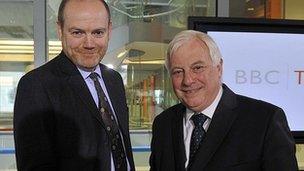Local radio cuts: BBC told to review plans
- Published

Lord Patten has asked Mark Thompson to reassess plans to make cuts in local radio services
BBC Trust chairman Lord Patten has ordered the corporation to re-examine its plans to make cuts to local radio.
Forty English radio stations were facing cuts of £15m and 280 jobs as part of plans to slash 20% from the BBC's budget over five years.
But Lord Patten said the cuts would have a "disproportionate impact" on the BBC's output and reputation.
Thousands of listeners, MPs and local authorities complained about the plans, saying the stations had a vital role.
The BBC Trust - which is the corporation's governing body - made its decision after hearing "real concerns" during a public consultation.
Lord Patten said: "Local and regional services in England provide something unique for audiences that can otherwise be neglected by the mainstream media. The BBC cannot afford to get these changes wrong."
The proposals were announced last October by director general Mark Thompson, following a lower-than-expected licence fee settlement.
Several stations faced losing between a quarter and a third of their staff, with neighbouring stations expected to share programmes in the afternoon.
Staff warned Mr Thompson at the Radio Festival in Salford last November that cuts would damage programme quality.
Lord Patten: "We realised how important local radio is to a sense of community"
Radio Merseyside presenter Roger Phillips said the station would lose 15 of its 46 staff, meaning "we can't provide quality at all".
A group of writers and cultural figures from Liverpool - including Willy Russell, Alan Bleasdale and Roger McGough - wrote an open letter to The Times complaining of the proposals, saying the station gave "voice to the beating heart" of the community.
Lord Patten said the trust had asked the BBC to review three key areas.
To scale back plans for local radio to share programmes in the afternoon, "although we accept that in some cases that might still be the best option".
To ensure that local stations have "an adequately staffed newsroom".
To protect specialist content outside peak times - for example local sports or specialist music shows.
Campaigning group Voice of the Listener and Viewer welcomed Lord Patten's speech and said in a statement: "We are delighted because this clearly demonstrates that the Trust does respond to what viewers and listeners want and the local cuts are very unpopular."
The Trust also asked the BBC to re-consider plans to merge regional current affairs programming, meaning fewer shows covering larger geographical areas.
And it suggested that the weekly current affairs show on BBC 5 live should be saved from cancellation.
BBC English regions controller David Holdsworth told staff in an email: "I am sure anyone working at one of our Local Radio stations or in one of our Inside Out teams will be pleased by this news.
"It is also gratifying to see that so many listeners and viewers value public service broadcasting at a local level and wrote to the Trust to say so. Put simply, it is clear many listeners and viewers feel passionately about what you do.
"However it is also the case that every pound not saved in these areas will have to be found somewhere in the BBC, as the challenges set by the licence fee settlement remain the same, and we will have to bear this in mind as we make our revised proposals, which will still include savings."
Lord Patten said he hoped the changes would cost the BBC "no more than £10m", which should come from "non-content budgets".
Director General Mark Thompson said the process "will be challenging" but he was glad that the trust had "endorsed the great majority of our proposals" to save money.
- Published19 January 2012
- Published1 November 2011